
Photo: IC
It has garnered significant attention in recent days on whether the China-US relations may embrace a breakthrough. After US President Joe Biden predicted that tensions between the US and China will "thaw soon," US media reported that China's newly appointed ambassador to the US, Xie Feng, has already set off for his new post, and there is a possibility of a series of high-level bilateral meetings between China and the US in the near future. All the information has raised expectations, although limited, for a stabilization of China-US relations. We believe that the increase in communication channels has created conditions for the "thawing" of China-US relations, but it does not guarantee "thawing" itself. The one who caused the freeze in China-US relations should create more conditions for substantial "thawing" of the bilateral relationship. This is also what the world, including US allies, hopes to see.
When China-US relations sneeze, the world catches a cold. Currently, the China-US relationship has caught a severe cold, and the root cause lies entirely in the erroneous perception of China by the US side. In its feverish pursuit of "winning" against China, Washington has repeatedly brandished its cudgel at China. Now, it frequently expresses its desire for dialogue with China. This naturally raises suspicions among Chinese people. Could this be another case of "weasel wishes the rooster a Happy New Year?" It is not just the Chinese who have doubts; there are also questions within the international community and even domestically in the US about whether Washington genuinely intends to stabilize China-US relations.
In recent years, every time there are positive signs and indications of restarting dialogue between the two sides, they are quickly extinguished by Washington's suppression and containment actions against China. When President Biden made his prediction about the China-US relationship "thawing soon," even some US media expressed surprise: the US had just rallied its G7 allies against Beijing, so where does this optimistic expectation come from? Therefore, some believe that this is merely a so-called "pacifying" rhetoric from Washington to avoid strong reactions from China, or it could be Biden's "eagerness to demonstrate" his desire for a warming of China-US relations, without actually having high expectations for the outcome.
However, we still hope that President Biden can have the integrity of a state leader, rather than making cheap and rash statements like many politicians in Washington. We noticed that while President Biden made a statement that the China-US relationship will thaw, he also mentioned that the US government is considering lifting sanctions on the Chinese defense minister. However, the US State Department spokesperson quickly denied this statement, which is considered largely due to the pressure of its "domestic political correctness." Lifting the illegal sanctions on the Chinese defense minister, as well as on Chinese officials, institutions, and companies, is something Washington should do first to correct its mistakes. This is also a prerequisite for equal dialogue between the two sides. Otherwise, what is the point of communication?
There are many things that the US can and should do if it truly wants to correct its policy toward China and regain trust. For example, it should abide by WTO rulings and lift tariffs on Chinese goods; it should stop blocking and suppressing China in the high-tech sector; it should stop fabricating human rights issues and using them to suppress specific industries in China; it should remove unreasonable restrictions and interference on cultural exchanges between China and the US, especially ideological visa restrictions, and so on. These are relatively easy to push forward, but the most fundamental thing is to stop interfering in China's internal affairs, maintain its one-China principle, and not support "Taiwan independence" forces and other similar stances. In short, given how much cold water the US has poured on the China-US relationship in recent years and how much cold wind it has stirred up, there should be just as many ways for it to show its sincerity in communication now.
The US needs to establish a basic understanding that Chinese people have become somewhat numb to what it says. In contrast, all Chinese people are closely watching US actions, from the Taiwan Straits to China's periphery, from the technological field to cultural exchanges, and so on. These will greatly affect the status of China-US relations. Otherwise, is it possible to have a "thaw" when they shout for dialogue with a mask on their head but a hidden weapon in their hand?
If China-US relations are to "thaw," we certainly welcome it, but the US must be sincere. The Chinese people have no intention of participating in the "masquerade" held by Washington. From the focus of American public opinion on Ambassador Xie's remarks, it is indeed difficult for us to be optimistic about whether the US can change its ways. The US is keen to evaluate and compare how much "wolf warrior" in each Chinese diplomat, which shows that the US has failed to listen to China's frank and clear expression of its position. Washington's focus is fundamentally off the mark, leading to increasingly erroneous and absurd perceptions of China. We will see if President Biden's statement represents a true "change of tune" for the US.



